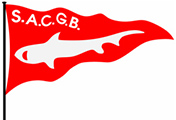Earlier in the year, Dr. Simon Thomas and I took the decision to have a go at creating a UK shark catch record database. As a committed and passionate shark angler, Simon already had a number of years’ data which he had collected personally and, as a previous secretary of the Shark Angling Club of Great Britain, I was aware that the club had catch records from the 1950’s to the present day which it very kindly agreed to share with us. We then contacted a number of shark skippers whom we knew well and they very kindly gave us access to their records. Initially we loaded the contributing skippers’ data along with some of the more recent data from the SACGB. This resulted in a database of circa 20,000 records which was a tremendous start.
Simon immediately started to analyse and process these data and, so far, has produced two scientific papers from it. One of these has been recognised by the International Commission for the Conservation of Tunas (ICCAT) which has asked him to present the paper at its next conference in Madrid.
We have now loaded the majority of the earlier SACGB data and the database now comprises over 70,000 records. Once the contributors’ 2020 data and the remaining SACGB data are loaded we could potentially have as many as 100,000 records. We believe this possibly makes it the largest shark database outside the one held by NOAA which is based in the US.
Our vision was always to collate as much high quality historical data as possible then add current data to it each year. We are at that point now and have begun to work on sourcing more good quality data from additional contributors.
We have also taken the decision to give our database a name as that will help us promote the work we do and position it in the minds of those we want to influence to protect the sharks and our sport.
Some of you will perhaps know, or have heard of, Pat Smith. She is the current World and British Record holder for Porbeagle with a 369lb fish she caught out of Looe in 1970.
Pat is 96 so no longer goes sharking but visits Looe every year and proudly wears her fishing smock which is adorned with badges recognising her record from the IGFA, Hardy, the SACGB and others, when she walks around town. At 96 she still has a passion for the sport and is always keen to hear about recent events. She is an inspiring lady and we are pleased she has allowed us to call the database The Pat Smith Database.
Recreational angling is recognised as a stakeholder in the new Fisheries Bill so positioning ourselves as a serious contributor to the protection of sharks and others species through this form of citizen science will help the sport achieve the recognition it deserves from economic, scientific and well-being perspectives.
We are keen to hear from skippers or individuals who are willing to share their shark catch data with us. The basic data we need from every fishing trip is the number and species of sharks caught and released, sex and an estimated weight. If you catch no sharks on a trip, we would like to know that as well because, from a scientific perspective, this is just as relevant as data from a day when you do catch sharks.
We continue to see this as a team project and not something which belongs to any individual. The agreement we have with all data contributors is that we will never share their raw data with anyone without their permission. This is important to us as it leaves the contributors in control of their data and enables us to be independent of any restrictions often associated with working alongside university-linked programmes or similar
All contributors are provided with regular updates on developments and their contribution is recognised by adding their names to the scientific papers; so, if you would like to share your data with us and be a part of this exciting citizen science project please contact Simon Thomas or John McMaster.
